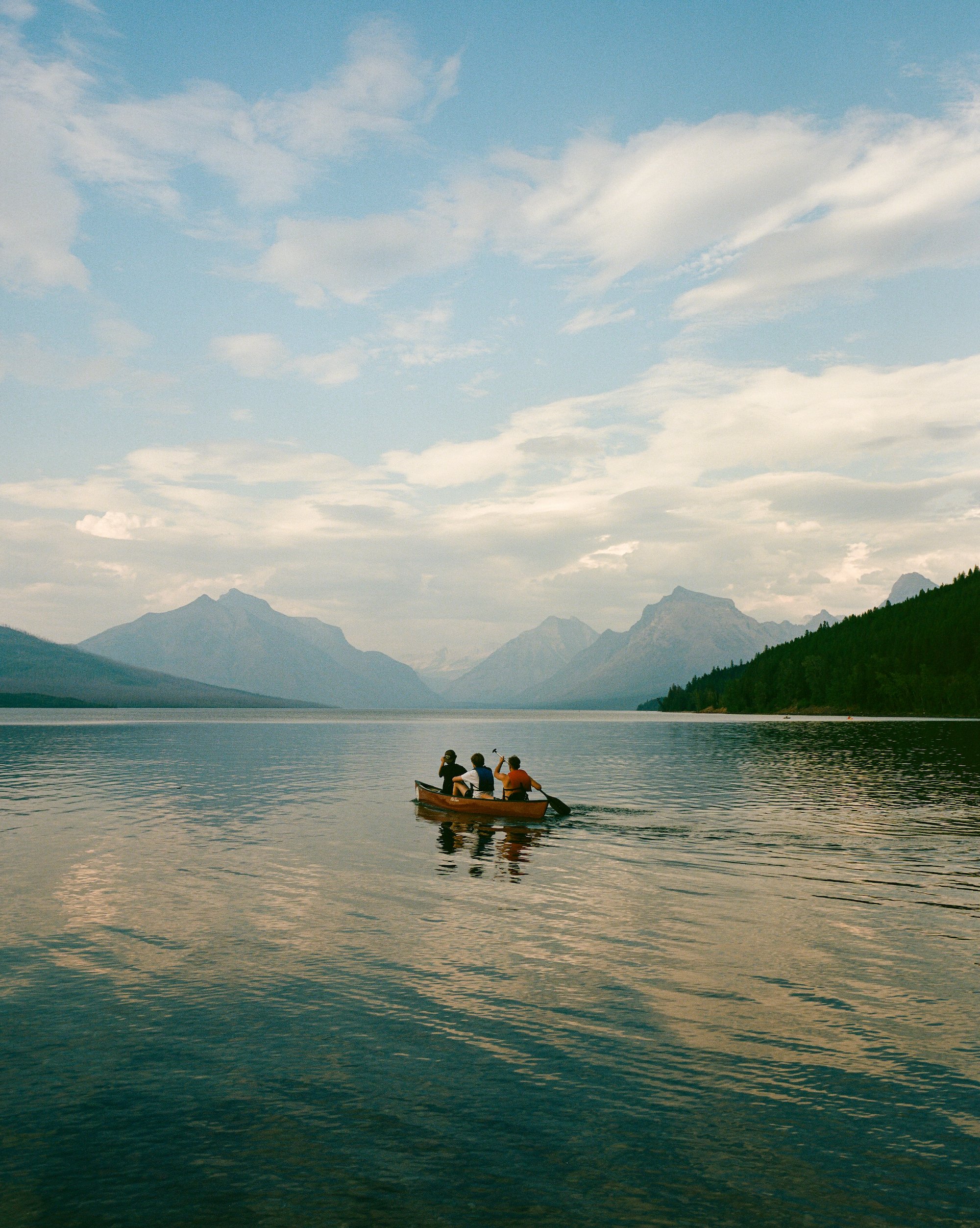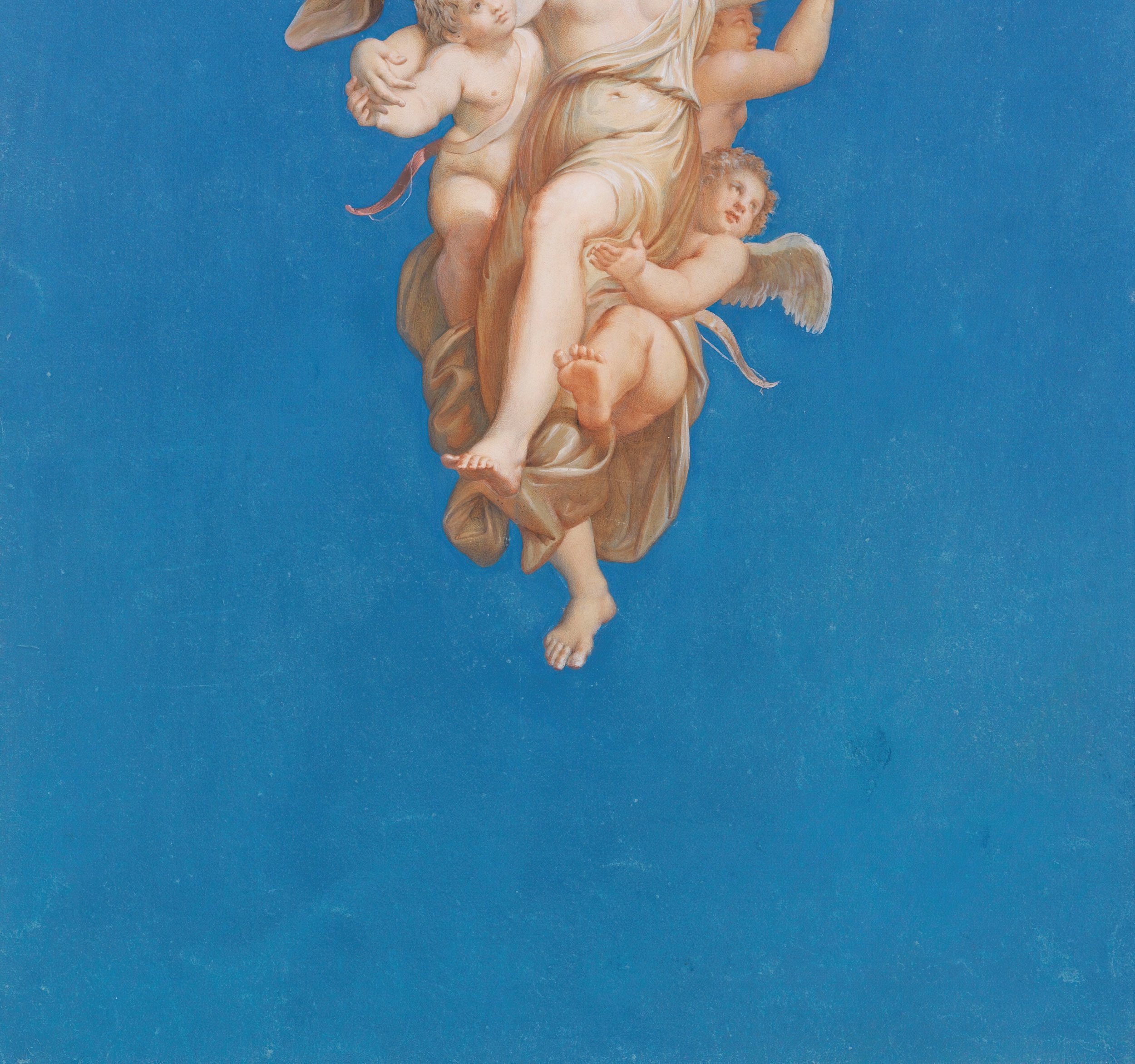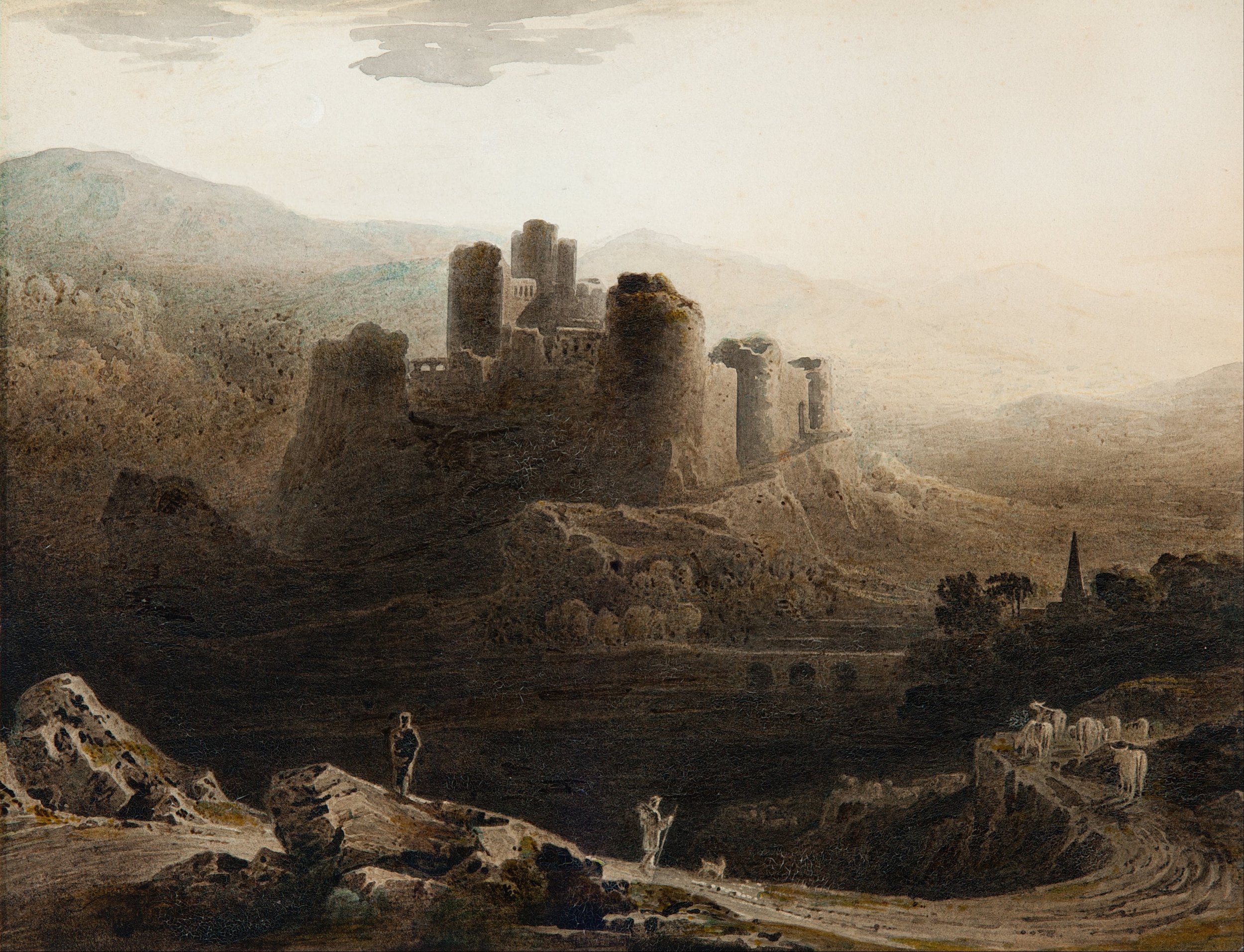Standing Bare Before Infinity

Standing Bare Before Infinity
Josh Nadeau
On Ancient Cosmology & Sublimity
This essay is featured in Ekstasis Issue 10 Print Edition
“Even in your world, my son, that is not what a star is, only what it is made of.”
— C. S. Lewis, Voyage of the Dawn Treader
I was generally unenthusiastic about outer space for the majority of my young life. My heart was interested in more terrestrial things: cops and robbers, cowboys and indians, Indiana Jones, and Batman. Aliens and foreign crafts could stay unidentified, as far as I was concerned. But, as happens with most things, something changed me. Something, and subsequently, someone, turned my apathy for the Great Beyond into a passionate curiosity.
*
Our van pulled up to the main park lodge around ten in the morning, another few cars trailing behind in our small caravan. Parking then stretching after a four-hour drive, we grabbed our packs, and me and a few others headed to the main office to check in, sign some dotted lines, grab our canoes, and head out. We were on a portage trip, some fourteen of us. The lady behind the counter, who collected our cash and signatures, let us in on some bad news: only three of the light canoes were left, which meant the other four would be full weight, around 70 pounds—ann ominous set of circumstances considering that we had about three or four miles to hike that day, carrying the canoes and all our gear.
It was already hot and humid, the heavy sort of air that weighs on you like regret and bad decisions. Beads of sweat gathered on brows. We broke off into pairs, putting one person with portage experience with someone who lacked it. Our canoes were filled, and we set off to the “boat launch.” I grew up in the country for a significant portion of my young life, had been camping and canoeing at a cottage every summer since I was four, and was in a Christian version of the Boy Scouts growing up, so I took the back seat of the canoe, and steered my less experienced partner as we paddled onto the lake. The first leg of our trip was a few miles by water, reaching a trail access point, and hiking the mile and a half to the next body of water. Our canoes pulled up to shore, and everyone slung their packs onto their backs, lifted their canoes onto their shoulders, and began the hike. Everyone except me and my partner. She informed me the canoe was too heavy and that she’d only be able to carry her pack and a small bag of kindling. There was really nothing else I could do, so I heaved the 70-pound canoe onto my shoulders and began hiking.
The sun beat down on the canoe, creating some sort of sweat lodge, black flies swirling in and out, enjoying free reign of my body for their nutrition—I couldn’t take either hand off the canoe, lest I tip and fall. So on I went, step by step, the salt of perspiration staining my lips. My legs strained up small hills, my back was tense to balance the load, and my knuckles grew white as my hands gripped the lip of the canoe. Eventually, I made it. I placed the canoe in the water—others were already setting sail, my partner waiting for me, an uneasy look on her face.
I was exhausted, and we had the more difficult part of the trip ahead of us: back onto the lake, a few more miles by water, another trail access point, and another portage. More strain, more tension, more burning. White knuckles, grit teeth, and one foot in front of the other for two miles. Over hill and root, roasting in midafternoon sun. Eventually, a breeze picked up; we had made it, just another short paddle to our campsite. When we arrived, most of the other tents were up, most of the others were in swimsuits, and some were tanning on rocks, while others were prepping a small fire for dinner. I did the same: put up my tent, put on my bathing suit, and plunged into the icy water—the kind that washes away exhaustion with shock.
We all laughed the evening away, eating hotdogs and s’mores cooked over the fire as the sun lowered behind the tree line. The sky transformed from bright blues to oranges to purples to the deep indigo of evening. One by one, at different intervals, people said goodnight and went to sleep in their tents. I laid on a rock by the fire, looking up at the night sky. As the flames died down to embers, I grew more and more entranced by the starry canvas, by the glow and pull of it.
There was no light pollution. It was just me, on a rock, underneath the infinity. I had seen the stars before, but not like this—everything felt aglow, almost alive. I could see the haze of the Milky Way, the twinkle of little stars, and I was beginning to imagine the burning sprawl of galaxies, beginning to hear the music of the spheres—the natural harmonic tones supposedly produced by the movement of the celestial spheres or the bodies fixed in them. I was transported, the weight of glory bearing down upon me. The heavens collided before my eyes, stars shot across the many hues of an onyx expanse. All of the cosmos burst with intensity and power and majesty. Everything in my vision, so many hundreds of thousands of miles out of my grasp, seemed, somehow, close, like I could reach out and grab a star and hold it in front of me. Like I could consume it, have it become a part of me. It was the overlap of transcendence and immanence. I was floating, like Major Tom, in the most peculiar way. Just me before infinity.
*
Outer space, for the majority of my life, had been a void; empty, save for a few planets and stars many thousands of light years away. And, to be fair, I was, at that time, in the final year of obtaining my undergrad degree in physics. I had all the explanatory tools of mankind available to me—I could calculate the motion of star systems, I knew the gravitational dance between planets, and we postulated about space and time and infinity and black holes. But this was different. This was more real, tangible, definite. I could explain what it was all made of, but I couldn’t explain what I was feeling, or why. C.S. Lewis voiced my sentiment in Voyage of the Dawn Treader when Ramandu explains to a regenerated Eustace, “Even in your world, my son, that is not what a star is, only what it is made of.” I was begging to feel this. Not what space was made of, but what it truly was. Outer space, in that moment, transformed. It was no longer the void—it was the heavens.
A few years down the road I read Lewis’s Cosmic Trilogy. In the first book, Out of the Silent Planet, Lewis says this:
“But Ransom, as time wore on, became aware of another and more spiritual cause for his progressive lightening and exultation of heart. A nightmare, long engendered in the modern mind by the mythology that follows in the wake of science, was falling off him. He had read of 'Space': at the back of his thinking for years had lurked the dismal fancy of the black, cold vacuity, the utter deadness, which was supposed to separate the worlds. He had not known how much it affected him till now-now that the very name 'Space' seemed a blasphemous libel for this empyrean ocean of radiance in which they swam. He could not call it 'dead'; he felt life pouring into him from it every moment. How indeed should it be otherwise, since out of this ocean all the worlds and all their life had come? He had thought it barren: he now saw that it was the womb of worlds, whose blazing and innumerable offspring looked down nightly even upon the earth with so many eyes-and here, with how many more! No: Space was the wrong name. Older thinkers had been wiser when they named it simply the heavens - the heavens which declared the glory.”
It was then that everything clicked.
The cold lack of enthusiasm I had for outer space was a necessary consequence of my perspective. I viewed space as a machine—and I had the education to see the gears, hear the whir, and watch it all churn. I could tell you what a star was made out of, but not what it truly was, and I needed answers.
*
Lewis, in his inaugural address at Cambridge, called himself an Old Western Man, and by that he meant, a man whose heart and mind and soul exist in the time period before the Great Divide—a change of cultural ideologies—around the end of the 18th century. The Old Western Man lived in an alive universe, less concerned with how things work, and more enraptured with why they work. All of creation, to them, was a book, brimming with the meaning that God had imbued it with. The cosmos had vibrancy and mythology. This, by his own estimation, was Lewis—he both knew and loved medieval cosmology, and he saw the universe as “tingling with anthropomorphic life, dancing, ceremonial, a festival not a machine.” He was less concerned with what everything was, and more concerned with why.
This is what was lost after the Great Divide—the movement towards the “new mythology” of the modern mind. The full embrace of rationalism. The universe lost its tune, it became merely describable, and the sacred nature that the entirety of the cosmos possessed, by virtue of being created by God, was abandoned.
I was beginning to see clearly again, with new eyes, prepared to embrace a new lore. The world was enormous and magical, teeming with the supernatural. That night, some thirteen years ago, alone before the Great Beyond, all my modernist readings of the cosmos were abolished—even the Christian versions of it, where God set the machine in order, and it all grinds along according to plan. I was beginning to learn a new language—one that was true, just at a different level. Facts are true, yes, but they are not the only truth. Parables, though no more than stories or fables, contain multitudes. My view was expanding, to see the picture of the universe, to develop stories that answered the question why.
*
The world we currently live in is orphaned, lost and astray between so many varying and competing world views—cut off from ground control. There’s a bedrock of naturalism and scientism that tells us everything that can be known, about self and everything around us, can be seen, touched, heard, smelled, or tasted. We live in a measurable world. At the same time, people are desperate for more, a longing for something indescribable and incomprehensible. They are like me, exhausted from carrying the heavy burdens of life, longing to feel the weight of the transcendent—but there’s no mechanisms, no pathway, at least not ones that make sense, not ones that keep things consistent.
Our culture longs for spiritual wholeness, but you can’t locate a spirit, let alone dissect it and analyze it. We hear stories, tales, of abductions, or extraterrestrial crafts, or alien encounters, and we love them, but don’t know how to make sense of them. We postulate about alternate timelines and time travel; about a future when machines rise to almost human-like sentience, and it terrifies us.
I think this is because we don’t know how to make sense of it all, Christians included. We’ve settled for a world where all the problems are made up of square-shaped holes, and when a star comes by, or a UFO, or any other intergalactic wonder, we don’t know where it fits. To be honest, I don’t think most of us have an answer, at least a good one, to the Star that led the Magi. Was it a real star that moved some hundred million miles away? Did it move closer, maybe even into our atmosphere, and guide that troupe to the manger side? Was it an angel?
In the very old cosmology, in the ancient near east, the stars, the heavenly host, were exactly that—divine beings. That story, in the gospels, is the overlap of the transcendence and immanence—a moment where that which is bigger than what’s measurable, in a scientific way, enters into our context, all presented as fact.
I’m not here to answer all the deep questions of our modern times, or give my two cents about Sasquatch, aliens, ghosts, the Rise of the Machines, or anything about what happens during any form of psychedelic trip. What I am here to say, or at least draw your attention to, is that the world is bigger, and more alive, than we tend to realize. In the coming days, we will need more than a “baptized modernism” to answer the questions that haunt the Modern Man. We will need Old Western Men and Women, who have stood bare before infinity, ready to proclaim and embody the weight of glory, prepared to do more than explain what things are made of, but what they truly are.
Josh Nadeau
Full Time Artist & Writer
Josh is the Artist Behind Sword and Pencil and is the Founder of Every Day Saints
Photography by Jake Tovar
This essay is featured in the newest Ekstasis Print Edition. Enjoy the fullness of what we have to offer and support our work by buying a copy for your coffee table, office space, or reading nook.




